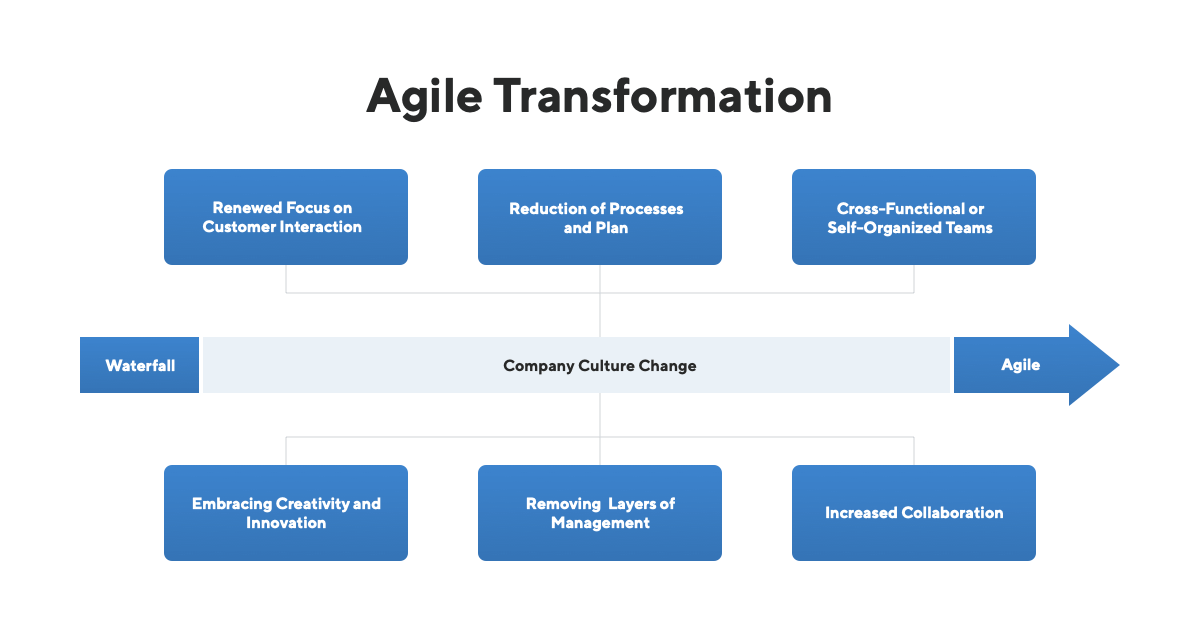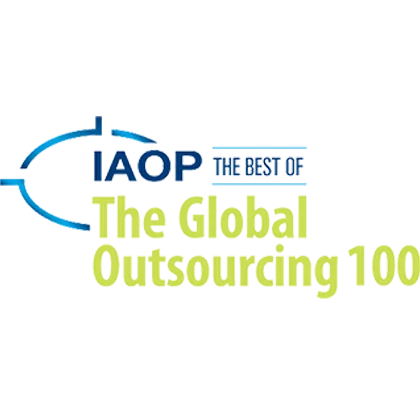The current business landscape leaves no time to linger. Software product companies or IT service providers understand that being flexible and skilled in responding to arising changes is a necessity rather than an additional benefit. These conditions push C-level executives to reconstruct processes and approaches within the company and embark on a quest for transformation.
Agile, a philosophy introduced in 2001, becomes a driving force of such shifts as entrepreneurs rebuild their companies around the main Agile principles. However, Agile transformation goes beyond implementing Agile software development methodologies. It reinvents the company’s culture to a reactive approach and creates a flexible, collaborative environment.
How does DevOps fit into this equation? This methodology, built around integrating software development and IT operations, originates from Agile with practices like automation or CI/CD. DevOps culture becomes an irreplaceable part of Agile transformation, enabling shorter timescale and faster feedback look.
Program-Ace, an experienced provider of DevOps development services, knows how to successfully leverage DevOps approaches to enable Agile transformation and set you up to complete such an initiative successfully. So, let’s dive into the subject with this article!
The Essence of Agile Transformation Explained
Agile transformation is a paradigm shift that impacts an organization's very core. While many associate Agile solely with software development methodologies like Scrum or Kanban, its transformational essence stretches beyond these confines.
Fundamentally, Agile transformation is about reshaping an organization's approach to its projects, strategies, and operations. One of its primary objectives is to foster an environment ripe for creativity — a space where innovative ideas aren't just welcomed but actively encouraged. This creative spirit often leads to solutions more aligned with customer needs and market demands.

Another critical element of Agile transformation is its focus on empowering employees. Agile insists on reducing unnecessary management layers, consequently triggering streamlined decision-making processes and a greater sense of ownership and responsibility among team members. In this environment, employees feel valued, heard, and motivated to contribute their best.
Next, Agile also places a strong emphasis on enhancing customer satisfaction. When the competition is as intense as it is currently, companies must be able to adapt to customer feedback and pivot when necessary. Organizations that embrace Agile principles often find themselves better equipped to respond to customer needs promptly and efficiently.
From an organizational structure standpoint, Agile transformation can lead to forming cross-functional teams. These teams, comprised of members with varied expertise, can handle projects holistically, from inception to completion, reducing the need for handoffs and mitigating the challenges they bring. Such restructuring also often results in simplified processes, leading to faster execution and decision-making.
Lastly, the essence of Agile promotes a culture of open communication. Transparent and frequent communication ensures that all stakeholders, from top-tier management to entry-level employees, are aligned with the organization's goals and progress.
What Is the Role of DevOps in Agile Transformation?
DevOps represents a set of foundational principles designed to bridge gaps between software development and IT operations, fostering a culture of collaboration and streamlined processes. At its core, DevOps aims to improve software delivery's speed, efficiency, and quality.
Within the broader context of Agile transformation, DevOps plays an important role. While Agile focuses on iterative development and quick response to changes, DevOps ensures that the developed software can be reliably released into production at high velocities. This synergy means organizations are not just developing the right products quickly with Agile, but they are also delivering them efficiently to the end users through DevOps.
One of the hallmarks of DevOps that bolsters Agile transformation is the emphasis on continuous processes, notably continuous integration (CI), continuous delivery (CD), and continuous feedback.
In the CI process, developers frequently merge their code changes into a central repository. After merging, automated builds and tests are run. CI helps detect and address integration errors quickly, promoting a more cohesive development environment that aligns seamlessly with Agile's iterative nature.
CD takes CI a step further by automating the software release process. After the build and tests, the application is deployed to production automatically. This ensures that software can be reliably and quickly released at any time, which is invaluable in an Agile setup where quick iterations and releases are the norm.
Beyond just development and delivery, DevOps emphasizes the importance of feedback loops. As software is deployed, feedback is continuously gathered from various stakeholders, from automated monitoring tools, end-users, or operations teams. This feedback informs future development cycles, ensuring the product evolves in tune with actual user needs and operational realities.
As organizations embark on their Agile transformation journey, integrating DevOps becomes indispensable. When blending Agile's responsiveness with DevOps' efficiency and reliability, businesses can unlock the next performance and customer satisfaction levels.
The Agile Transformation Process: Step-by-Step Guide
Initiating an Agile transformation is a challenging task that requires careful planning, commitment, and iterative adjustments. While it's a transformative shift, it's also a structured process organizations follow to ensure successful adoption and seamless transition.
1. Initial steps
The transformation typically begins by assembling a leadership team with varied expertise and perspectives. This group is responsible for crystallizing the organization's vision for Agile, setting clear and measurable goals, and preparing a comprehensive roadmap. It acts as a guiding document, charting the various milestones and strategies for the transformation journey.
2. Periodic reviews
Agile, by its very nature, is adaptive and responsive. So, as organizations progress along their roadmap, periodic check-ins and reviews are crucial. These provide opportunities to assess progress, learn from successes and setbacks, and make necessary adjustments to the roadmap, ensuring it remains aligned with evolving business needs and realities.
3. Communication initiatives
Parallel to the tactical efforts, a robust communication strategy is vital. Companies must ensure that every stakeholder understands the transformation's objectives and is continuously updated about the progress. A transparent and open communication channel fosters a sense of ownership, alignment, and commitment across the organization.
4. Pilot projects
Before diving headfirst into a full-scale transformation, we would advise testing the waters with smaller pilot projects. These serve as trial runs, allowing teams to familiarize themselves with Agile methodologies, identify potential challenges, and refine strategies. The learnings from these pilots can then inform the broader transformation strategy, ensuring a smoother rollout.
5. Team-centric approach
One of the significant shifts is moving from an individual-centric to a team-centric approach to project assignments. Instead of selecting specific individuals for tasks, cross-functional teams are formed to handle projects from start to finish. This holistic approach reduces silos, fosters collaboration, and emphasizes collective ownership and responsibility.
As you can see, Agile transformation is a structured yet flexible process. While it demands strategic planning and execution, it also champions adaptability, ensuring organizations remain agile in the truest sense.
How Can DevOps Consulting Services Enhance Agile Transformation?
When integrated, Agile transformation and DevOps can reshape an organization's software delivery landscape. But integrating these two approaches isn't always straightforward. This is where DevOps consulting services become helpful, offering expertise and insights to harmonize these methodologies and amplify the benefits. Let's explore how these consulting services can enhance an Agile transformation journey.
Expert guidance. DevOps consulting services bring years of experience and a deep understanding of best practices. They can tailor DevOps strategies to fit an organization's unique needs, ensuring a seamless fusion with Agile principles. Such tailored approaches accelerate the transformation process and reduce the risk of missteps.
Efficient toolchain integration. An integral part of both DevOps and Agile is the utilization of specific tools for tasks like continuous integration, testing, deployment, and monitoring. A DevOps consultant can recommend and help to integrate the most suitable tools, ensuring that they align well with Agile workflows and provide maximum value.
Emphasizing continuous feedback. One core tenet of Agile is iterative improvement powered by continuous feedback. DevOps consulting services can set up mechanisms to gather, analyze, and act upon feedback from various touchpoints. This constant feedback loop refines the development process and aligns it closely with Agile objectives.
Streamlined workflows. With expert intervention, redundant processes can be identified and eliminated. DevOps consultants can design workflows that reduce bottlenecks and ensure that the Agile team's efforts transition smoothly from development to deployment, maximizing efficiency and optimizing the efforts of the teams.
Cultural transformation. Beyond just technical aspects, DevOps consulting services can guide organizations in cultivating a culture that embraces both Agile and DevOps philosophies. This includes fostering collaboration, breaking down silos, and promoting a mindset of continuous learning and improvement.
While Agile transformation is a journey towards more adaptive and swift software development, integrating it with DevOps can elevate its effectiveness multifold. With expert DevOps consulting services, organizations can ensure this integration is smooth, strategic, and synergistic, leading to unparalleled operational excellence and customer satisfaction.
Benefits of Using DevOps Consulting Services for Agile Transformation
Agile transformation, aiming to make organizations more responsive and adaptive, can derive substantial enhancement when integrated with DevOps. With their specialized expertise, DevOps consulting services can offer a strategic edge in this merger. Let’s look through the main benefits.
Customized strategy development
Every organization's landscape is unique. DevOps consultants assess a company's needs and challenges, ensuring that the DevOps strategies align perfectly with the organization's Agile goals.
Accelerated implementation
With their vast experience, DevOps consultants can expedite the transformation process. They bring proven methodologies and best practices that can speed up both the adoption and the realization of benefits from the Agile-DevOps merger.
Resource optimization
Consultants can recommend tools and technologies that align with an organization's Agile workflows. This means no wastage of tools that don't fit or overlap in functionalities, ensuring cost-effectiveness and efficient resource utilization.
Risk mitigation
A seasoned DevOps consultant can foresee potential pitfalls and offer preventive solutions. This proactive approach reduces disruptions, ensuring a smoother Agile transformation journey and faster result achievement.
Cultural nurturing
A significant part of Agile and DevOps is the cultural shift. DevOps consultants can guide teams in imbibing a collaborative spirit, emphasizing continuous improvement and breaking traditional silos.
Continuous training
As the landscape evolves, continuous upskilling becomes crucial. Consulting services often provide training sessions, workshops, and ongoing support to ensure teams stay updated and navigate the evolving challenges seamlessly.
Challenges in Agile Transformation and What Solutions DevOps Consulting Offers
Though beneficial, Agile transformation comes with its own challenges that organizations grapple with. However, the integration of DevOps, especially with the guidance of DevOps consulting services, provides effective solutions to these challenges. Let's explore this synergy in depth.
1. Resistance to change
Challenge: One of the most significant hurdles is resistance from employees who are used to traditional workflows and are reluctant to change.
DevOps solution: With their extensive experience in cultural transformations, DevOps consultants can guide organizations in crafting strategies to foster acceptance, such as workshops, training sessions, and continuous feedback loops.
2. Inefficient tool integration
Challenge: Organizations may struggle with integrating Agile-specific tools into their workflows, leading to inefficiencies.
DevOps solution: DevOps consultants can recommend and assist in integrating the most suitable tools that complement Agile methodologies, ensuring smooth workflows from development to deployment.
3. Lack of clear communication:
Challenge: Agile demands frequent and transparent communication, which can be a challenge for teams working in silos.
DevOps solution: DevOps emphasizes collaboration and breaks down silos. Consultants can help set up communication platforms and practices that promote clear, cross-functional communication.
4. Inadequate skillsets:
Challenge: Transitioning to Agile might expose team skills and knowledge gaps.
DevOps solution: DevOps consulting services can identify these gaps and offer targeted training sessions, ensuring that teams are well-equipped to handle Agile projects.
5. Scaling difficulties:
Challenge: While small teams might easily adopt Agile, scaling it across the organization can be daunting.
DevOps solution: Consultants can provide strategies for scaling Agile practices without compromising efficiency, leveraging DevOps automation principles and continuous integration.
6. Managing complex workflows:
Challenge: As organizations transition, the complexity of workflows can increase.
DevOps solution: DevOps emphasizes streamlined and automated workflows. Consulting services can help restructure and simplify processes, making them more manageable and efficient.
While Agile transformation presents challenges, DevOps consulting services' expertise offers solutions that address these issues and optimize the entire transformation process.
The Main Tools and Technologies Powering Agile Transformation with DevOps
The efficient integration of DevOps tools and technologies can heavily impact the success of Agile transformation. From version control with Git to continuous integration using Jenkins, and collaboration via platforms like Slack, specialists should focus on choosing the right solution and ensuring its correct operations. They ensure smooth operations, efficient workflows, and rapid, high-quality software releases when integrated correctly. Our DevOps engineers prepared the list of options for the main tools.
| Function | Tool/Technology |
| Version Control | Git, GitHub, Bitbucket |
| Continuous Integration | Jenkins, Travis CI |
| Continuous Delivery | Docker, Kubernetes |
| Configuration Management | Ansible, Puppet, Chef |
| Monitoring & Feedback | Nagios, Grafana, Splunk |
| Collaboration & Planning | Jira, Trello, Slack |
| Testing & Quality | Selenium, JUnit |
| Infrastructure as Code | Terraform, AWS CloudFormation |
The Financial Perspective: ROI of Integrating DevOps Consulting Services
Through our article, you can read about the numerous benefits of using DevOps consulting to accelerate Agile transformation. And while the advantages look promising, how will this value look from a financial perspective? So, let us share the formula you can use to count the ROI of DevOps consulting:

Here, net benefits include gains from the service (like reduced costs and increased revenue), and cost implies the final costs of consulting and integration.
Now, let’s look through the main gains you can get from DevOps consulting.
1. Accelerated time-to-market
DevOps consulting aids organizations in streamlining their development and deployment pipelines. With continuous integration and delivery practices, products reach the market faster, leading to quicker revenue generation.
2. Reduced infrastructure costs
DevOps consultants emphasize automation, which significantly diminishes the need for manual intervention. This reduces infrastructure costs, as automated processes can handle tasks like server provisioning, monitoring, and scaling more efficiently.
3. Enhanced product quality
DevOps promotes frequent testing and continuous feedback, ensuring bugs are identified and rectified early in the development cycle. This boosts product quality and reduces the expensive and time-consuming process of fixing bugs after deployment.
4. Increased operational efficiency
By breaking down silos and promoting collaboration, DevOps ensures smoother communication and fewer bottlenecks. With experts guiding the transformation, operational processes become more efficient, leading to savings in terms of both time and resources.
5. Revenue growth
Combining quicker releases, high-quality products, and enhanced user experiences invariably leads to satisfied customers. Happy customers often increase sales, repeat business, and positive word-of-mouth, contributing to revenue growth.
6. Reduction in downtime
Continuous monitoring and instant feedback loops flag any potential system issues, helping to address the problems immediately. This reduces system downtime, ensuring businesses don't face revenue losses due to unexpected outages.
7. Skill enhancement
DevOps consultants typically provide training sessions, ensuring the in-house team is well-equipped with the latest industry practices. While there's an initial investment in training, the long-term benefits of productivity and innovation are invaluable.
We propose an illustrative breakdown for the DevOps consulting initiative so you can get an image of the possible ROI.
- Accelerated time-to-market: Assume earlier time-to-market leads to an additional revenue of $500,000.
- Reduced infrastructure costs: Automation and efficient processes save $200,000 annually.
- Enhanced product quality: Fewer bugs and improved user experience result in savings and added revenue, let's say $100,000.
- Increased operational efficiency: Efficiency savings are estimated at $150,000 annually.
- Revenue growth: Repeat business and positive word-of-mouth generate an additional $300,000 in sales.
- Reduction in downtime: Reduced downtime saves approximately $50,000 in potential lost sales.
Total Net Benefit: $1,300,000.
Assuming the cost of DevOps consulting and integration was $400,000, the ROI can be calculated as:

In conclusion, integrating DevOps consulting services presents a compelling case from a financial viewpoint. While upfront costs are associated with hiring consultants and integrating new tools, long-term financial gains in increased revenue, reduced costs, and enhanced efficiency offer organizations a positive and tangible ROI.
The Next Phase in Agile and DevOps Synergy: Future Trends
Agile and DevOps, two methodologies transforming the software development industry, will grow further, upgrading and polishing their value. Their synergy, which has proven fruitful for rapid development and deployment, will evolve with new trends shaping their future landscape. Here are some insights into the forthcoming trends that will mark the next phase in Agile and DevOps collaboration.
Artificial intelligence and machine learning integration
AI and ML will become integral to DevOps, automating intricate tasks and predicting potential issues before they arise. In the context of Agile, AI can help in sprint planning by analyzing past sprints and recommending optimizations.
Enhanced security protocols – the rise of DevSecOps
Value stream management
Value stream management will enhance the collaboration between Agile and DevOps teams. It will enable organizations to visualize the flow of value across tools and teams, ensuring that they’re always delivering maximum to the customer.
Infrastructure as Code (IaC)
While IaC isn't new, its prominence will grow. It enables developers to manage infrastructures using code and automation, ensuring consistency across environments. As Agile promotes frequent releases, IaC ensures the infrastructure can keep up.
Remote work optimization
With remote work becoming a norm, tools, and practices will evolve to support distributed Agile and DevOps teams better. This includes enhanced collaboration tools, virtualized environments, and cloud-based solutions.
Holistic observability
Instead of just monitoring, the future will emphasize observability. It provides a more comprehensive insight into system health and performance, assisting Agile teams in understanding the impact of their iterations in real time.
As cyber threats grow in complexity, there will be a stronger emphasis on integrating security into the DevOps pipeline, leading to the rise of DevSecOps. This approach ensures that security is not an afterthought but an inherent part of the development lifecycle.
Consult with the top DevOps Specialists from Program-Ace
The Agile transformation, as well as the implementation of DevOps, might look like a complex journey. Yet, while posing challenges, every company can go through it successfully when partnering up with a reliable partner.
Program-Ace, a software development company with three decades of experience, leverages DevOps and Agile on a daily basis. Our consulting specialists will help you harness the power of these two methodologies and pivot them in the way they bring the most value to your company. Contact us to learn more about our DevOps consulting, and we will be glad to give you a hand on your transformation road.




















